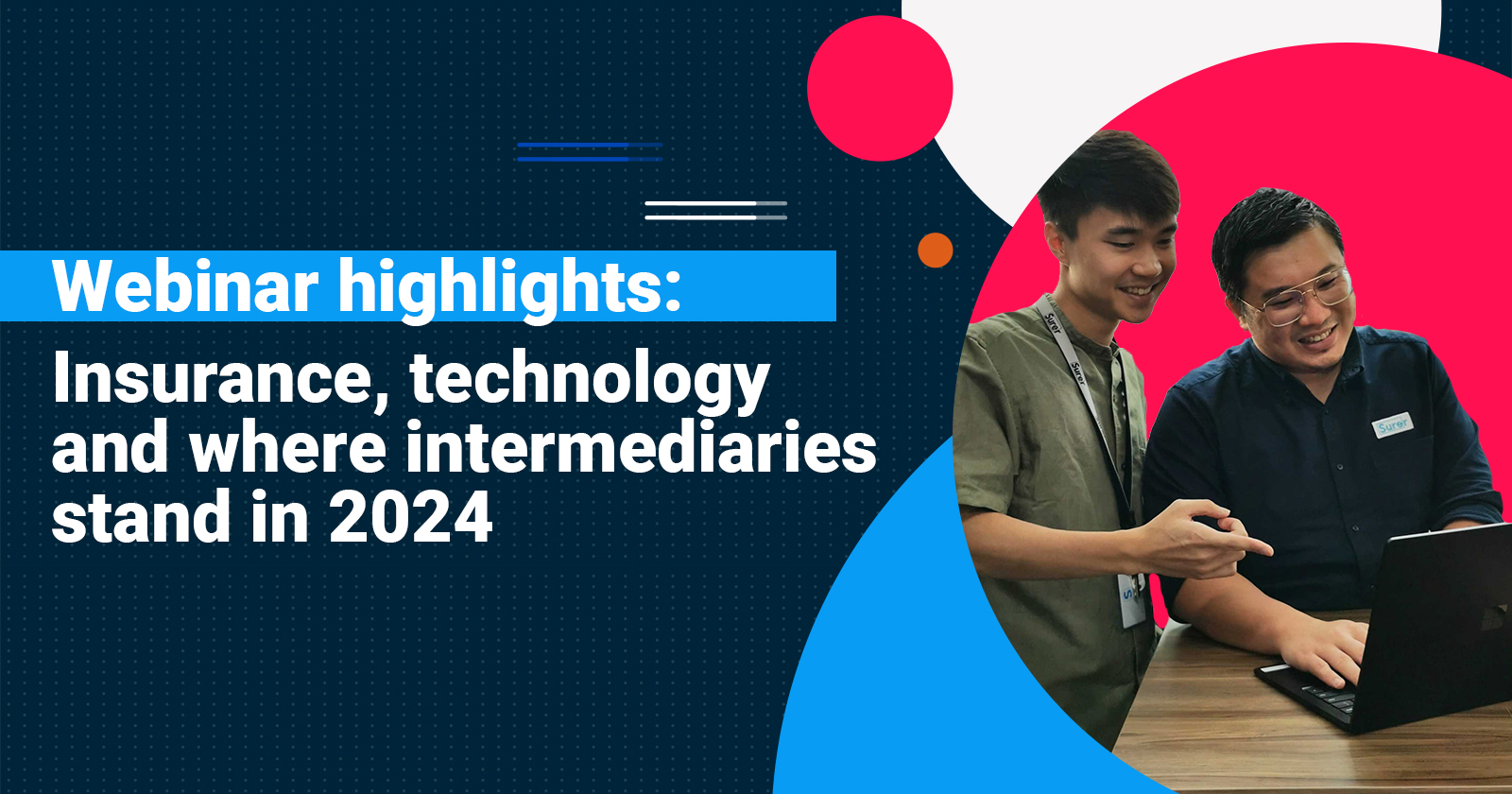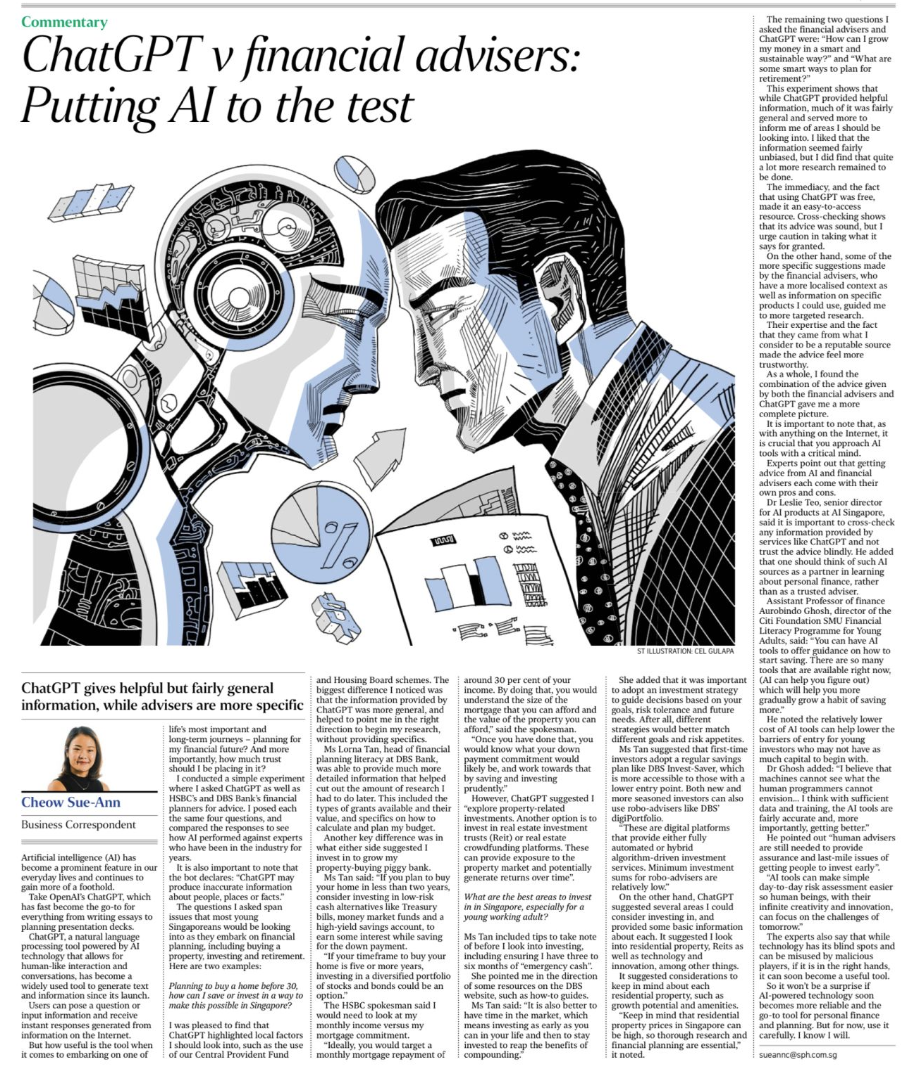
Thank you to everyone who attended this webinar that happened on 25 Jan ‘24! As always, fret not if you weren’t able to attend. This article will bring you highlights of what was shared at the webinar! With the theme of the webinar being ‘insurance, technology and where intermediaries stand in 2024’, we broke the webinar down into the following key segments: The webinar started with a look at what consultancy houses and the media is predicting for intermediaries in 2024. Key excerpts from Deloitte’s 2024 global insurance outlook (Source: https://www2.deloitte.com/us/en/insights/industry/financial-services/financial-services-industry-outlooks/insurance-industry-outlook.html) Key excerpts from PwC’s article, ‘The increasingly strategic role of insurance brokers and independent agencies’ (Source: https://www.pwc.com/us/en/industries/financial-services/library/insurance-distribution.html) Key excerpts from EY’s 2024 Global Insurance Outlook (Source: https://www.ey.com/en_gl/insurance/global-insurance-industry-trends) Key excerpts from Lexology’s article, ‘2024: The next stage in the insurtech market evolution’ (Source: https://www.lexology.com/library/detail.aspx?g=2c243aff-1285-420f-9ab6-6dae00932c7d) Key excerpts from Digital Insurance’s article, ‘The top 10 trends shaping the future of insurtech in 2024’ (Source: https://www.dig-in.com/opinion/predictions-the-top-insurtech-trends-for-2024) The speaker concluded that intermediaries will continue to play an integral role in 2024. The caveat to this was that intermediaries must learn to leverage technology to drive process efficiency so that they can focus on providing value from an advisory standpoint. Citing the research paper, ‘Advancing the Art of Advisory’, the following key points were shared to back this thought: Following are some of the key points quoted from the research paper ‘Advancing the Art of Advisory’: This was backed by the fact that 57% of millennial investors feel that technology reduces the personal touch and face-to-face interactions in their wealth relationships – considerably higher than the overall global age group of 39%. It was then shared that the human touch remains indispensable with the following points used to expand on this thought: This was backed by the fact that 72% of investors prefer to retain the ‘human touch’ in their wealth planning journey. The speaker concluded that advisors are a trusted source of advice sharing 66% of retail investors consider their primary financial advisor as the most trusted source of advice, compared to other sources. He quoted the following two paragraphs from the article to broaden on the above point: Then speaker continued into the next segment of the webinar to share views on why digitalisation matters to intermediaries. The speaker shared some pain points that team at Surer had identified across its survey and user research. A survey conducted found that the top pain point faced by intermediaries is the difficulty in getting quotes due to slow/non-replies. It was further shared that in a user research conducted: Understanding the problem to be solved is as important as providing the solution – this helped shed light on where digital transformation can play a role as a solution. It was further shared that intermediaries should consider digital transformation for good reasons and not just because it is a buzzword. Understanding pain points and how it relates to solutions basically means that you digitise because it does good for your business. NOT because everyone else is doing and you just jump on the bandwagon accordingly. The speaker used the analogy of ‘adding chill to laksa’ and said
You add chilli to your laksa to make it spicier. And you do it because you like it spicier. Not because you see everyone adding chilli and you just follow suit right?
Essentially, trying to drive home the point that one should not just follow a trend just because it is a trend! Do it because it helps the business. Know your why… then think about how The above table was shared to illustrate identifying the ‘why’ and then determining the ‘how’. Going back to the Laksa analogy… the ‘WHY’ = I want my laksa to be spicier. the ‘HOW’ = add chilli! Tech is available to help rid process and sales efficiency barriers. But how you leverage it and how the users are trained to use it will require effort. The speaker then shared a few more case studies to answer the questions of ‘Why digitise your business?’ citing these as examples of how the industry is building tech to support not disrupt the business of an intermediary. Article referenced: 2022 insurance industry outlook Article referenced: How Agents and Insurtechs Can Work Together Article referenced: 5 reflections on the insurance industry in 2021 Having covered the view that 2024 will see intermediaries continue to thrive – if they focus on their advisory skills – and how digitalisation allows them to do so, the speaker then covered how intermediaries can blend the two worlds for their benefit. The segment started with the sharing of how technology cannot replace the human touch and shared some stats and reasons for this…. It was shared that especially in Commercial Insurance, In Europe 75% of complex insurance ‘researched online, purchased offline’ while In the US Intermediaries accounted for 70.8% of commercial premiums. Diving deeper into this, we shared about key stats in a research where: The speaker then shared a little about our perspective of why this could be the case – fear and optimism bias. Optimism Bias: Our brain is built to be optimistic as a default. We will first believe that that we are less likely to suffer from misfortune and more likely to attain success. What has it to do with insurance? One of the reasons why the industry always say ‘insurance requires selling’ It is a built-in resistance to purchasing / or being motivated to purchase Insurance. Fear: The brain is trained to to be more afraid of what we can understand, rather than one that seems foreign or abstract What has it to do with insurance? So, how we fear or how we have learnt to ‘prioritise’ fear can explain some of the resistance some Insurance. How I die seems to take higher priority over dying itself. In general, technology will not be able to replace the ‘spark’ to get clients to think about insurance proactively – our brain is just not tuned to WANTING insurance The speaker went on to shared some points as to why insurers and policyholders/customers still need intermediaries (from a practical standpoint): The speaker then shared that clients do want to speak to an advisor FOR THE RIGHT REASONS – to be advised not sold. A couple of key stats from this survey/research was shared: The speaker closed out this segment by sharing specific areas of which tech can help intermediaries. A feedback that the team had gotten was that we should include the showcase of tangible features / functions that intermediaries can leverage; to be able to draw parallels between what has been shared and what can be used. The speaker did exactly that by sharing some of Surer’s features that help an intermediary digitally transform. Product Customisation and creating your own ‘package’ template The parallels of tech helping to drive leads, qualification and speed in deal closing were drawn in relation to the above features was shared to be as follow: — Once again, here’s taking the opportunity to thank all our users who made time for this and we hope to see you again in our next Webinar! It is fuss-free. No credit card or payment required.Key highlights
Trends and predictions for 2024
What are the big consultancy houses saying?
What are insurance media outlets saying?
Intermediaries will always be in the game

Using the above article as a case study, the speaker shared that while there has been buzz around AI and its undeniable ability, it was mentioned that digital tools can only help customers kick-start research. However, intermediaries are still required to provide good context both on a personal level and at the geographic level.
Embracing digitalisation of your business
Importance of digital transformation
Why digitise your business?
WHY
HOW
I want to close a deal faster
Cut out all the (repetitive) effort you have to put in to source for multiple quotes
I want ease in managing my business
Automate the tracking of all your deals (past, present or future)
I want to close more deals
Expand your network digitally to get more referrals
Combining human advisory with technology
What tech CANNOT do
Intermediaries provide customers with the necessary information required to make educated purchases/ informed decisions. Intermediaries are there to explain what their clients need, and the options available to them.
Intermediaries act as the person with the knowledge to get the client started. Without a wholesome knowledge of the insurance industry, it is hard to even get going to do research OR trust the research you have done; essentially, clients don’t know what they don’t know.
Clients: may know what risks they want to cover but do not have a wide overview of the right insurer
Insurer: may have all the information in the market but are ultimately in a tough position to fully understand the prospective client
Enter the intermediary. You know the marketplace, you know where to get answers to questions, and you know what information is required on both sides.Little known sales prospecting stats
What can tech help with in your business
Tech helps you do more by working less, drives your business faster and ultimately, empowers you to spend more time on more important matters.
Clients lean on you for expert advice; someone who has our best interest at heart. Intermediaries should not be bogged down by repetitive administrative matters.
A product or service aims to solve a problem for a client and the client in turn, pays for this product or service. So, your first instinct should always be ‘how to solve my client’s problem’ not ‘what I want this client to buy’Leveraging Insurtech: Surer case studies
Subscribe to our Telegram channel or stay tuned to our Facebook or LinkedIn pages to get updates on more of such initiatives!
Are you an Insurance intermediary? Sign up for free now!
Subscribe to our Telegram channel to get the most insightful articles delivered to you automatically!
